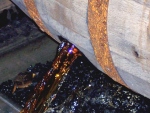Yes, Farnsley. My apologies to all of the Farnsleys.
As for Maker's and "small batch," I tend to think the most obvious explanation for anything is most likely correct. Maker's Mark made the decision 50 years ago to use 1,000 gallon (i.e., 19-barrel) dump tanks, for whatever reason. Only fifty years later did they suddenly decide to associate that existing practice with a term, "small batch," coincidentally coined by their new parent company. But, at the same time, now that they have declared that anything more than 19 barrels is not "small batch," reporters who will ask if, say, Knob Creek batches are fewer than 19 barrels, which they most certainly are not. And everyone will have a good laugh.
No, I'm lying. Truth is, there's a secret lexicon of archaic distilling terms and we don't want it to fall into Canadian hands.
Meaning of Small Batch
Moderator: Squire
-

EllenJ - Registered User
- Posts: 866
- Joined: Sun Feb 26, 2006 11:00 pm
- Location: Ohio-occupied Northern Kentucky (Cincinnati)
Obviously, the myth-makers in marketing want to attribute these things to the Master Distillers, who they have made the personification of the company. Better to have the products seem to be made by a man than by a factory. However, even Paul Pacult's American Still Life, which is virtually an official history of the Beam company, credits the idea for Booker's to Mike Donohoe, a company sales executive. Booker had long had his "private stock" that he hand-selected from the whiskey he made at the Boston plant. Winemakers have done this for centuries, making and selecting a "private stock" for themselves and their families. The Germans even have a name for it, "Kabinett." Literally, the wine the winemaker keeps in the cabinet for himself.
Booker kept his in an unlabeled 1.75 L Jim Beam bottle. I had the honor of drinking from that bottle, with Booker, in his kitchen, as have many others. Booker did this for no reason other than, hey, he had a whole distillery's output at his disposal, why shouldn't he drink the whiskey from there that he liked best?
On at least two occasions, his wife blew the door off their stove by grabbing the Booker's bottle, thinking it was 80 proof Jim Beam, when making her bourbon baked beans recipe.
This had been going on for years when Mike got the idea of bottling it as a business gift and, later, as a consumer product.
Booker is quoted in Still Life as explaining it this way, "This isn't Jim Beam, it's just a special individual batch from a special place in the rackhouse."
By "batch," Booker meant the output of one day's distillation that was all aging in a particular place in the rackhouse. Normal practice, there and at most of the distilleries, is for a "batch," in that sense, to be about 50 barrels, but it might be 45 in some cases and 60 in others. That's not the whole day's output, which would be hundreds of barrels, but they divide them up among different warehouse locations in batches of about 50 barrels, give or take.
Virtually the exact same thing was explained to me by Elmer, that the way he selected a "batch" for Blanton's would be to taste a few barrels and when he found one he liked, that barrel and the 50-or-so others from the same "batch" would be pulled and dumped. He was a little shy about admitting he didn't taste every single barrel.
So that's what most distillers mean by "a batch," a set of approximately 50 barrels, all made on the same day and all stored together in one warehouse.
Booker kept his in an unlabeled 1.75 L Jim Beam bottle. I had the honor of drinking from that bottle, with Booker, in his kitchen, as have many others. Booker did this for no reason other than, hey, he had a whole distillery's output at his disposal, why shouldn't he drink the whiskey from there that he liked best?
On at least two occasions, his wife blew the door off their stove by grabbing the Booker's bottle, thinking it was 80 proof Jim Beam, when making her bourbon baked beans recipe.
This had been going on for years when Mike got the idea of bottling it as a business gift and, later, as a consumer product.
Booker is quoted in Still Life as explaining it this way, "This isn't Jim Beam, it's just a special individual batch from a special place in the rackhouse."
By "batch," Booker meant the output of one day's distillation that was all aging in a particular place in the rackhouse. Normal practice, there and at most of the distilleries, is for a "batch," in that sense, to be about 50 barrels, but it might be 45 in some cases and 60 in others. That's not the whole day's output, which would be hundreds of barrels, but they divide them up among different warehouse locations in batches of about 50 barrels, give or take.
Virtually the exact same thing was explained to me by Elmer, that the way he selected a "batch" for Blanton's would be to taste a few barrels and when he found one he liked, that barrel and the 50-or-so others from the same "batch" would be pulled and dumped. He was a little shy about admitting he didn't taste every single barrel.
So that's what most distillers mean by "a batch," a set of approximately 50 barrels, all made on the same day and all stored together in one warehouse.
-

cowdery - Registered User
- Posts: 1586
- Joined: Tue Oct 19, 2004 1:07 pm
- Location: Chicago
It strikes me, too, that "small batch" is like other things printed on labels that make or seem to be making some claim that could be a matter of interpretation, or may mean nothing at all, but have neither a legal meaning nor a generally accepted one in the industry.
I'm looking at a W. L. Weller Antique bottle. It doesn't say "7 years old," it says, "7 summers old." Distillers will tell you that summer is where the action is. I'm not doubting the statement is true, just noting that it is a slightly different claim. "7 summers" is a little better than "7 years."
Also on that same bottle are the words "aged naturally." Presumably, this means aged in unheated warehouses, but this is subject to a little more interpretation. Does it really mean that? Stitzel-Weller, of course, didn't have heated warehouses but Buffalo Trace does. Not all of its warehouses are heated, just a couple, but should I take this as a promise that no Weller Antique has ever been stored in a warehouse that was heated?
These are worthy issues to discuss and, ultimately, to question distillers about.
What Maker's says on their web site is this: "Maker’s Mark is currently the only operating bourbon distillery to make whisky in batches of less than 19 barrels -- the traditional standard for small-batch whisky." I say that's marketing hype, but I intend to ask.
I'm looking at a W. L. Weller Antique bottle. It doesn't say "7 years old," it says, "7 summers old." Distillers will tell you that summer is where the action is. I'm not doubting the statement is true, just noting that it is a slightly different claim. "7 summers" is a little better than "7 years."
Also on that same bottle are the words "aged naturally." Presumably, this means aged in unheated warehouses, but this is subject to a little more interpretation. Does it really mean that? Stitzel-Weller, of course, didn't have heated warehouses but Buffalo Trace does. Not all of its warehouses are heated, just a couple, but should I take this as a promise that no Weller Antique has ever been stored in a warehouse that was heated?
These are worthy issues to discuss and, ultimately, to question distillers about.
What Maker's says on their web site is this: "Maker’s Mark is currently the only operating bourbon distillery to make whisky in batches of less than 19 barrels -- the traditional standard for small-batch whisky." I say that's marketing hype, but I intend to ask.
-

cowdery - Registered User
- Posts: 1586
- Joined: Tue Oct 19, 2004 1:07 pm
- Location: Chicago
cowdery wrote:Not that I've ever heard, and I've been in and out of distilleries for a while. If you ask any distillery hand about "small batch," the first words they'll say are, "well, that's a Jim Beam term and ..."
As I said, I think Maker's is being very clever. They've clearly sucked at least one person in.
HUH? WTF? Have you got a sound recording of that verbal exchange?
ima'd sure like to hear it.

-

bunghole - Registered User
- Posts: 2157
- Joined: Wed Oct 13, 2004 10:42 am
- Location: Stuart's Draft, Virginia
Mike, regarding the term single barrel, when looking for something else recently I found at http://www.kybiz.com a Lane Report on bourbon from 2001 in which Elmer T. Lee was interviewed on the origin of Blanton single barrel. To find this, simply log into the site and enter "single barrel" or "small batch" and you will see the story referred to. Elmer states that he was asked by the company to come up with a premium bourbon. He says he got the idea to offer a single barrel from the specialty bottlings Colonel Albert Blanton did in the 1930's and 40's. He does not say specifically that those bottlings had the term single barrel on them although from the way he told the story, they might have.
At the same time, he makes it clear he was "asked" to come up with a "premium" bottling. I'd be surprised if the request had not been made in light of the success at the time (and to this day) of single malt whiskies including single cask bottlings of same. But for his part, Elmer remembered something that Colonel Blanton had done... So I don't think he was inspired by a Scots whisky idea, or not 100%.
As often happens, a number of things seem to have combined to result in the product that was developed.
Gary
At the same time, he makes it clear he was "asked" to come up with a "premium" bottling. I'd be surprised if the request had not been made in light of the success at the time (and to this day) of single malt whiskies including single cask bottlings of same. But for his part, Elmer remembered something that Colonel Blanton had done... So I don't think he was inspired by a Scots whisky idea, or not 100%.
As often happens, a number of things seem to have combined to result in the product that was developed.
Gary
-

gillmang - Vatman
- Posts: 2173
- Joined: Mon Jan 24, 2005 4:44 pm
There is no doubt that Elmer selected the barrels that became Blanton's, and probably was key to setting up the single-barrel bottling line. That line and the decision to set it up and operate it in a particular way is a big part of the program and has enabled BT to develop and launch many other single barrel products.
Subsequently, Heaven Hill set one up as well. Jim Beam, on the other hand, made the decision not to and, consequently, has no single barrel products.
The obvious problem with getting too lathered up about the terms "single barrel" and "small batch" is that they are so ordinary and literal. Every whiskey was "single barrel" when whiskey was only sold by the barrel and there were oodles of "small batch" distilleries that only filled about 20 barrels a day.
This is why I find myself befuddled by what seems to be a search for some secret meaning behind these very ordinary expressions.
Subsequently, Heaven Hill set one up as well. Jim Beam, on the other hand, made the decision not to and, consequently, has no single barrel products.
The obvious problem with getting too lathered up about the terms "single barrel" and "small batch" is that they are so ordinary and literal. Every whiskey was "single barrel" when whiskey was only sold by the barrel and there were oodles of "small batch" distilleries that only filled about 20 barrels a day.
This is why I find myself befuddled by what seems to be a search for some secret meaning behind these very ordinary expressions.
-

cowdery - Registered User
- Posts: 1586
- Joined: Tue Oct 19, 2004 1:07 pm
- Location: Chicago
23 posts
• Page 2 of 2 • 1, 2
Who is online
Users browsing this forum: No registered users and 103 guests
